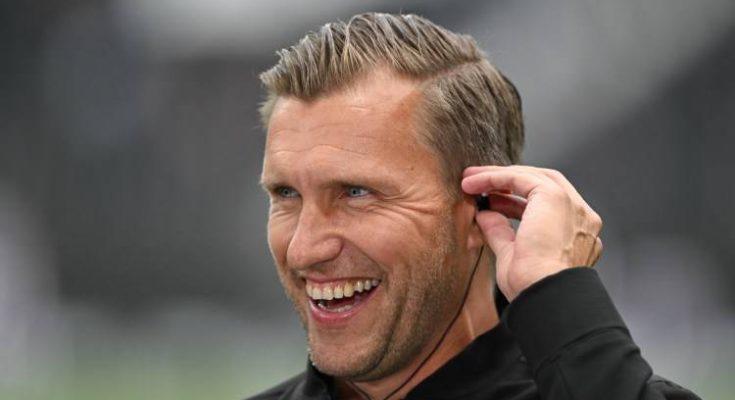The football landscape in Germany has always thrived on rivalries, bold moves, and surprising management decisions, but few stories in recent years carry as much intrigue as the emerging rumor connecting Bayern Munich with Markus Krösche. The Eintracht Frankfurt sporting director has earned himself a reputation as one of the sharpest architects of success in the Bundesliga, and his potential move to Säbener Straße could have a ripple effect across the league. For Bayern, who have endured turbulent months with inconsistency in performance, controversial internal debates, and a search for long-term direction, Krösche could represent a turning point. For Frankfurt, however, the possible loss of their mastermind behind recent triumphs would be nothing less than a nightmare scenario.
The speculation itself underscores the volatile nature of football management at the highest level. Bayern Munich, a club that prides itself on stability, winning culture, and global dominance, has found itself uncharacteristically unsettled. Managerial changes, shifting power dynamics at the board level, and questions over transfer strategies have created an atmosphere of uncertainty. The once seemingly invincible machine has shown cracks, both on and off the pitch. Against this backdrop, the name Markus Krösche resonates as a potential savior—someone who combines modern football thinking with a proven ability to build competitive squads under pressure.
Krösche’s rise in German football is no coincidence. His tenure at RB Leipzig already showcased his tactical acumen in recruitment, squad development, and structural organization. Known for identifying talent before the rest of the market reacts, he helped Leipzig become a consistent Champions League contender and pushed the boundaries of how a so-called “project club” could challenge traditional giants. Moving to Eintracht Frankfurt in 2021, Krösche took on a different type of challenge. Unlike Leipzig, Frankfurt does not operate with corporate-style resources or a massive financial cushion. Instead, Eintracht is a proud club with a loyal fan base, passionate culture, and a history of both glorious moments and heartbreaking setbacks.
At Frankfurt, Krösche managed to balance ambition with pragmatism. He assembled squads that combined experienced leaders with emerging talents, often pulling off signings that seemed unremarkable at the time but blossomed into key contributors. His crowning achievement came when Eintracht Frankfurt won the UEFA Europa League in 2022, a moment that elevated the club’s international standing and brought back memories of its historic successes decades earlier. That triumph alone cemented Krösche’s legacy in Frankfurt, but his work since then has been equally impressive. The club remained competitive in the Bundesliga, avoided falling into the trap of post-success stagnation, and built a structure that suggested sustainability.
For Bayern Munich, who are used to having the pick of not only players but also executives from around Germany, the attraction to Krösche is clear. They see in him a man who understands the modern transfer market, has a keen eye for potential, and can handle the demands of leading a top club. What sets Krösche apart is his ability to blend vision with adaptability. While some sporting directors thrive only within certain financial frameworks or club identities, Krösche has demonstrated flexibility: success with a corporate-backed club like Leipzig, and success with a traditional, fan-driven powerhouse like Frankfurt. This duality could make him the perfect fit for Bayern, where tradition and modern demands constantly collide.
The idea of Krösche at Bayern also speaks to the record champions’ ongoing search for long-term stability in their leadership structure. The departures of iconic figures in recent years have left a vacuum. Uli Hoeneß and Karl-Heinz Rummenigge were not just executives—they were cultural pillars, symbols of Bayern’s dominance and aura. Their successors have struggled to project the same aura of control. Disagreements over transfer policies, the hiring and firing of coaches, and the delicate balance between sporting needs and commercial ambitions have all created turbulence. A figure like Krösche could bring clarity. His work at Frankfurt and Leipzig shows he does not chase headlines; he prioritizes structure, sustainability, and performance.
Yet, for Frankfurt, the prospect of losing Krösche is deeply concerning. The club knows how much of its recent stability and international recognition is tied to his strategies. Fans remember all too well the difficulties before his arrival—seasons of inconsistency, struggles in maintaining a clear squad identity, and financial limitations that often forced the sale of key players without adequate replacements. Krösche changed that dynamic. He created a culture of resilience, ensuring that even after stars left, Eintracht remained competitive. To lose him to Bayern, the club that has historically poached not only players but also coaches and managers from rivals, would feel like a heavy blow.
The ripple effects of such a move would extend beyond just Frankfurt and Bayern. Other Bundesliga clubs, watching the scenario unfold, would interpret it as another reminder of the imbalance in the league. Bayern’s ability to attract top talent off the pitch is just as strong as their pull on the pitch. For years, rivals have lamented that Bayern’s dominance is partly maintained by weakening competitors through such moves. Should Krösche join Bayern, it would reinforce this narrative, regardless of the legitimacy of his decision.
For Bayern’s fans, however, the idea is exhilarating. Many believe the club needs a fresh perspective at the sporting level, someone who is not weighed down by past baggage but who also understands the unique demands of Bayern Munich. Krösche fits that description perfectly. His record suggests he could modernize recruitment strategies, help establish a clearer identity on the pitch, and bring back the aura of control that has been missing. Supporters envision him as the man who could oversee the next great Bayern era, ensuring the club not only dominates domestically but also reclaims its feared reputation in Europe.
It is important to understand that Krösche’s strength lies not just in signing players, but in creating environments where they thrive. His holistic approach includes scouting, analytics, youth integration, and squad balance. At Frankfurt, he worked within financial boundaries but still built squads capable of challenging bigger budgets. At Bayern, he would have the resources to push his philosophy even further. Imagine his ability to identify undervalued talent, combined with Bayern’s financial muscle—it could be a dangerous formula for rivals across Europe.
The question remains whether Krösche himself is ready to make the leap. Frankfurt has given him freedom and trust, something not always guaranteed at Bayern, where the pressure is relentless and every decision is scrutinized. Some insiders suggest that Krösche values working in an environment where his vision is fully respected, and he may fear the political complexity at Bayern, where strong personalities dominate. On the other hand, the challenge of leading the Bundesliga’s biggest club, with the opportunity to shape its next era, may prove irresistible.
From Frankfurt’s perspective, contingency plans may already be under consideration. Clubs of their stature know that talent—on and off the pitch—rarely remains forever. But losing Krösche now, when the squad is still developing and the future projects are midstream, would be particularly destabilizing. The fear is not just about losing a sporting director, but about losing the very architect of their recent rise. The city of Frankfurt has embraced Krösche as one of their own, and his departure would be deeply personal for many fans.
Bayern Munich, meanwhile, will weigh the optics of the move carefully. The club understands its reputation as a predator in the German market, but they also know the importance of choosing leaders who can deliver results. If the rumors are true, and Krösche is indeed high on their list, it is because Bayern believe he can restore the sense of inevitability that once defined them. In recent seasons, both domestically and in Europe, Bayern have shown vulnerabilities that opponents have exploited. The arrival of a mind like Krösche could mark the beginning of a new cycle of dominance.
The story of Markus Krösche and Bayern Munich, whether it becomes reality or remains a tantalizing rumor, already highlights some of the core dynamics of modern football: ambition versus loyalty, financial power versus structural ingenuity, tradition versus innovation. For the Bundesliga, it is yet another reminder that the league’s balance of power often hinges not just on the players and coaches, but on the executives shaping the vision behind the scenes.
If Krösche does take the leap, his legacy in Frankfurt will remain intact, defined by the Europa League triumph and the steadying of a proud but previously unstable club. In Munich, he would inherit expectations of glory, where anything short of winning feels like failure. It would be the biggest challenge of his career, and perhaps the defining one. Frankfurt fears losing their guiding hand, while Munich dreams of rediscovering their dominance.
For now, the football world watches with anticipation, as whispers turn into speculation, and speculation threatens to become reality. Should Markus Krösche walk the halls of Säbener Straße in the near future, it will mark not just another managerial change, but a shift with implications stretching far beyond Munich and Frankfurt. It will be a symbol of how German football continues to evolve, how power consolidates, and how ambition never sleeps.



